
Econometrics
Scope & Guideline
Shaping the Future of Econometric Research
Introduction
Aims and Scopes
- Development of Econometric Models:
The journal emphasizes the creation and refinement of econometric models that can accurately capture economic relationships and dynamics. This includes traditional models as well as advanced techniques such as Bayesian methods, machine learning, and stochastic volatility models. - Application of Econometric Techniques:
Research published in the journal often involves applying econometric techniques to real-world data, covering various economic issues such as market forecasting, financial analysis, and policy evaluation. - Focus on Time Series and Panel Data:
A significant portion of the journal's content is dedicated to time series and panel data analysis, reflecting the importance of these methodologies in understanding economic trends and relationships over time. - Interdisciplinary Research:
The journal encourages interdisciplinary approaches, integrating insights from economics, finance, statistics, and data science to address complex economic questions. - Policy Relevance:
Many studies published in 'Econometrics' aim to inform economic policy by providing empirical evidence and analysis that can guide decision-making in various sectors.
Trending and Emerging
- Machine Learning in Econometrics:
There is a growing trend of incorporating machine learning techniques into econometric research, particularly for predictive modeling and data analysis, which allows for handling larger datasets and capturing complex patterns. - Causal Inference and Structural Models:
Research focusing on causal inference, particularly in the context of structural models, has gained traction, reflecting the increasing importance of identifying causal relationships in economics. - Impact of COVID-19 on Econometrics:
The pandemic has spurred a significant increase in studies analyzing its economic impact, utilizing innovative econometric approaches to assess various outcomes and inform policy responses. - High-Dimensional Data Analysis:
Emerging themes also include the analysis of high-dimensional data, which addresses the challenges posed by large datasets and the need for robust estimation techniques in econometrics. - Climate Change and Environmental Econometrics:
Research exploring the intersection of econometrics and climate change has become more prominent, indicating a growing recognition of environmental factors in economic modeling and policy analysis.
Declining or Waning
- Traditional Linear Models:
There has been a noticeable decline in studies focusing solely on traditional linear regression models, as researchers increasingly explore more complex and robust methodologies that account for non-linearity and other econometric challenges. - Basic Time Series Analysis:
The frequency of publications centered on basic time series analysis without advanced techniques has waned, as the field has moved towards more sophisticated methods that incorporate structural breaks, regime-switching, and multivariate approaches. - Static Economic Models:
Research based on static economic models has become less prominent, with a clear shift towards dynamic models that better capture the evolving nature of economic relationships and the impact of time-varying factors. - Descriptive Econometric Studies:
There has been a reduction in purely descriptive econometric studies that do not engage with advanced analytical techniques, as the journal's focus shifts towards more rigorous empirical research that offers deeper insights.
Similar Journals
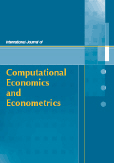
International Journal of Computational Economics and Econometrics
Transforming economic challenges into computational solutions.International Journal of Computational Economics and Econometrics is a peer-reviewed academic journal published by INDERSCIENCE ENTERPRISES LTD, focusing on the intersection of computational methodologies and economic analysis. With an ISSN of 1757-1170 and an E-ISSN of 1757-1189, this journal provides a crucial platform for researchers and professionals interested in innovative computational approaches to tackle real-world economic problems. While it currently does not operate under an open-access model, the journal is committed to advancing knowledge in its field, particularly as it occupies a vital niche within Computer Science Applications and Economics and Econometrics, ranking in the Q4 quartile for both categories as of 2023. Covering the period from 2017 to 2024, the journal aims to foster interdisciplinary collaboration and encourage the integration of advanced computational techniques into traditional economic theory and practice. As it continues to evolve, the International Journal of Computational Economics and Econometrics remains essential for academics and practitioners looking to stay at the forefront of technological innovations in economics.
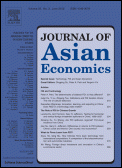
Journal of Asian Economics
Illuminating Economic Trends Across AsiaThe Journal of Asian Economics, published by Elsevier, serves as a pivotal platform for scholars and practitioners engaged in the comprehensive study of economic issues within Asia. With an ISSN of 1049-0078 and an E-ISSN of 1873-7927, this esteemed journal encompasses a wide array of topics in its scope, ranging from macroeconomic policy analysis to the intricacies of financial markets in the Asian context. Ranking in the Q2 category for both Economics and Econometrics and Finance, according to the 2023 metrics, it is positioned among the top-tier journals, currently holding a significant place at the 73rd percentile in Finance and 72nd percentile in Economics. This journal not only caters to academic researchers looking to publish their findings but also serves as an essential resource for professionals and students seeking to deepen their understanding of the dynamic economic landscape in Asia. By bridging empirical research and practical insights, the Journal of Asian Economics plays a crucial role in advancing knowledge and encouraging discourse in the field.
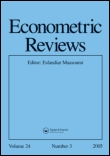
Econometric Reviews
Elevating the Standards of Econometric ScholarshipEconometric Reviews, published by Taylor & Francis Inc, is a premier journal in the field of Economics and Econometrics, recognized for its significant contributions to the advancement of economic theory and practice since its inception. With its ISSN 0747-4938 and E-ISSN 1532-4168, the journal has maintained a consistent publication record from 1982 to 2024, offering a platform for groundbreaking research that shapes the landscape of quantitative economic analysis. With a proud place in the Q1 category for Economics and Econometrics as of 2023, it stands as a critical resource for scholars, practitioners, and students alike, actively engaging with themes such as econometric methods, theory, and policy implications. Although operating under a subscription model, the journal’s high impact factor reflects its esteem within the academic community, fostering a rich dialogue among researchers in this evolving discipline. The journal’s office is located at 530 Walnut Street, Ste 850, Philadelphia, PA 19106, USA, forging connections in one of the central hubs of economic research.
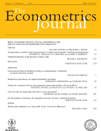
Econometrics Journal
Exploring New Frontiers in Economic MethodologiesEconometrics Journal, published by Oxford University Press, stands as a premier outlet for original research in the fields of Economics and Econometrics, boasting a commendable 2023 Q1 ranking within its category and an impressive 69th percentile rank in Scopus. Since its inception in 2006, the journal has consistently provided a platform for innovative methodologies and applications that contribute to the advancement of econometric theory and practice. With a focus on high-quality, peer-reviewed articles, the journal serves as a vital resource for researchers, professionals, and students alike, facilitating the dissemination of cutting-edge insights that push the boundaries of knowledge in economic analysis. Although it operates under a traditional subscription model, the journal's commitment to excellence and relevance in modern economic discourse positions it as an essential reference for those seeking to navigate the complexities of econometric research.
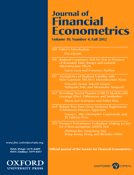
Journal of Financial Econometrics
Exploring the nexus of finance and econometrics.Journal of Financial Econometrics, published by Oxford University Press, stands as a leading academic journal in the fields of financial economics and econometrics. With an impressive impact factor and a ranking in the Q1 quartile for both Economics and Finance categories in 2023, this journal is recognized for its contribution to advancing theoretical and applied methodologies in financial econometric analysis. It publishes high-quality research that addresses critical issues in finance, aiming to foster a deeper understanding of the economic factors influencing financial markets and instruments. Researchers and practitioners alike benefit from its rigorous peer-reviewed articles, which are invaluable resources for both academic scholars and finance professionals. The journal’s content typically spans pioneering techniques in econometric modeling, empirical analysis of financial instruments, and innovative applications of econometric theory in real-world scenarios. Operating out of the United Kingdom, the journal continues to serve as a vital platform for disseminating significant research findings from 2005 to 2024, ensuring that the latest advancements in the field are accessible to its audience.

Quantitative Economics
Driving innovation in economics through open-access research.Quantitative Economics is a leading open-access journal published by WILEY, dedicated to advancing the field of economics through rigorous quantitative analysis. Established in 2010 and based in the United States, this influential journal boasts an impressive Q1 rating in the 2023 category of Economics and Econometrics, reflecting its high impact and quality within the field. With a Scopus ranking of #222 out of 716 in the Economics and Econometrics category, it sits comfortably in the 68th percentile, underscoring its relevance to researchers and professionals alike. The journal accepts a wide range of submissions, including original research articles, methodological advancements, and comprehensive reviews, which contribute to the understanding and application of quantitative methods in economic research. By providing immediate open access to all published articles, Quantitative Economics ensures that vital findings are readily available to academics, policymakers, and students across the globe, enhancing collaboration and innovation within the discipline.
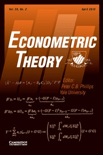
ECONOMETRIC THEORY
Pioneering Insights in Economic MethodologyECONOMETRIC THEORY is a premier journal published by Cambridge University Press, specializing in the intricate field of econometrics. With a strong commitment to advancing economic research since its inception in 1985, this journal has earned a distinguished reputation as reflected by its Q1 rankings in both Economics and Econometrics, as well as in Social Sciences (miscellaneous) categories for 2023. With ISSN 0266-4666 and E-ISSN 1469-4360, it serves as an invaluable resource for scholars, researchers, and practitioners who seek to contribute to the field through high-quality, impactful research. Although open access is not available, the journal ensures rigorous peer review and publication standards, solidifying its position as a vital platform for disseminating crucial findings in econometric methodology, empirical applications, and theoretical advancements. With an impressive Scopus ranking, particularly within its broad categories, ECONOMETRIC THEORY is essential reading for those looking to stay at the forefront of research in econometrics.

International Advances in Economic Research
Pioneering Insights in the World of EconometricsInternational Advances in Economic Research, published by SPRINGER, stands as a significant resource within the field of economics and econometrics, consistently contributing to the theoretical and empirical understanding of economic phenomena since its inception in 1995. With an ISSN of 1083-0898 and E-ISSN of 1573-966X, this journal is dedicated to advancing economic research through a rigorous peer-review process and disseminating high-quality scholarly articles. The journal's esteemed classification places it in the third quartile (Q3) within the Economics and Econometrics category for 2023, indicating its respectable standing in academic circles. It serves as an important conduit for the dissemination of innovative economic theories, data analysis, and policy discussions, appealing to researchers, professionals, and students alike. Though not an open-access journal, it provides valuable subscription-based content that enriches the understanding of diverse economic issues and fosters a community of inquiry among academics. With its projected outlook extending to 2024, International Advances in Economic Research continues to be an essential platform for scholars aiming to influence and engage with contemporary economic debates.
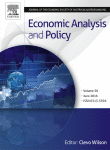
Economic Analysis and Policy
Empowering Economists to Address Today's ChallengesEconomic Analysis and Policy is an esteemed academic journal published by ELSEVIER, dedicated to advancing the field of economics and econometrics since its inception in 1970. Based in the Netherlands, this journal plays a pivotal role in disseminating high-quality research that addresses contemporary economic issues and policy challenges. With an impressive Q1 ranking in both the Economics and Econometrics categories, and recognition in the top 91st percentile of Scopus rankings, it is a leading platform for scholars, professionals, and students seeking to contribute to and engage with the evolution of economic thought. The journal does not currently operate on an open access model, allowing it to maintain rigorous peer-review standards that ensure the integrity and impact of published research. As a vital resource for anyone interested in the intersection of theory and policy in economics, Economic Analysis and Policy fosters a community committed to rigorous analysis and innovative solutions in the economic domain.
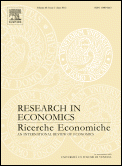
Research in Economics
Fostering rigorous analysis and theoretical development.Research in Economics, published by ELSEVIER SCI LTD, is a distinguished peer-reviewed journal that addresses pivotal issues in the field of economics and econometrics. Since its inception in 1997, the journal has provided a platform for innovative research and theoretical development, welcoming contributions that push the boundaries of traditional economic thought. With an ISSN of 1090-9443 and an E-ISSN of 1090-9451, it currently holds a respectable position in the Q3 category of the 2023 rankings for Economics and Econometrics. Despite its current Scopus rank of #500 out of 716, representing the 30th percentile, the journal continues to cultivate a rich community of researchers, practitioners, and students dedicated to advancing economic knowledge. While it operates without an Open Access option, the journal remains committed to disseminating high-quality research that informs both academic scholarship and practical applications in the economic landscape.